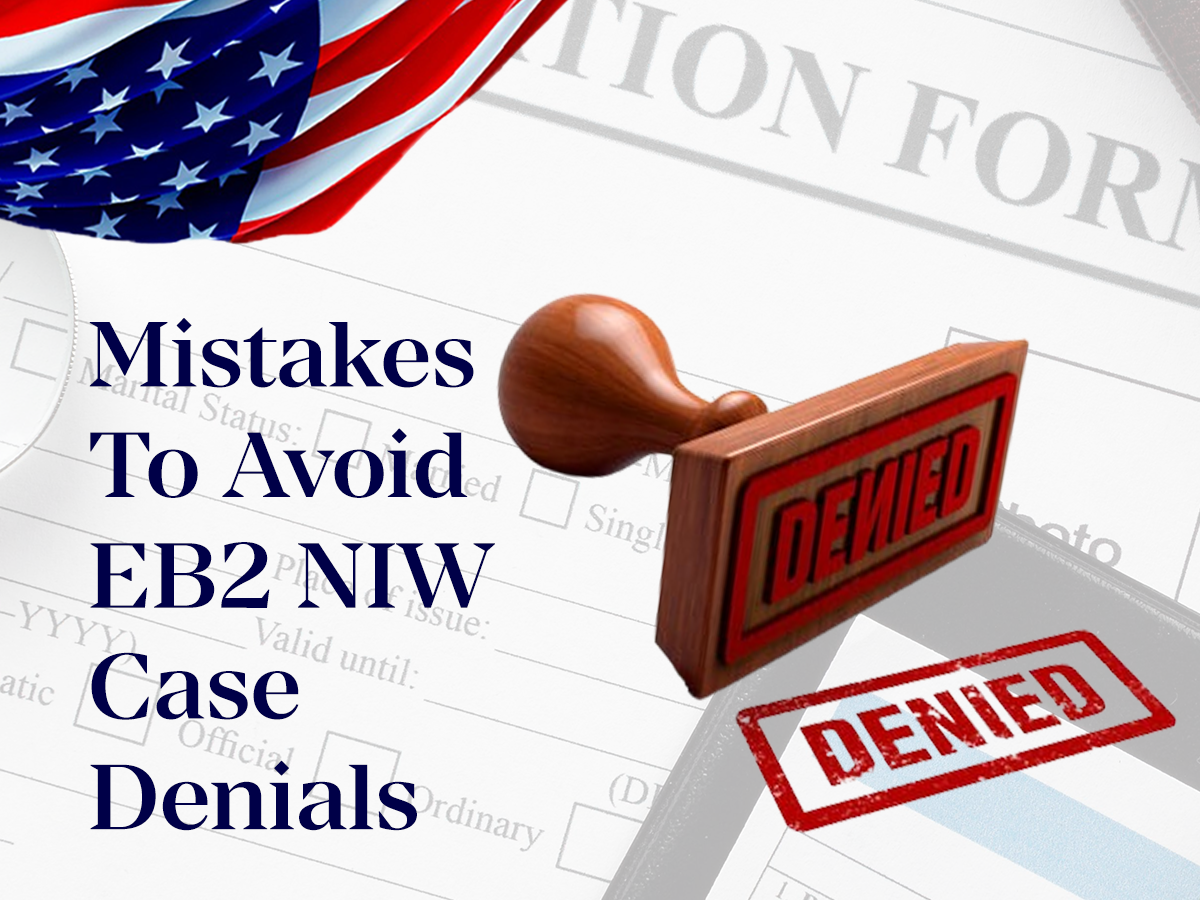
EB2 NIW Case Denial
EB2 NIW case denial means USCIS has reviewed your application and concluded that you do not qualify for a Green Card under the EB2 NIW category.
In addtition, this could be due to various reasons related to your qualifications, the proposed endeavor’s national impact, or the evidence provided.
A denial is a significant setback in your immigration plans and will typically be communicated to you through an official notice from USCIS explaining the reasons for the denial.
Mistakes to Avoid EB2 NIW Case Denial
Navigating the EB2 NIW process requires meticulous preparation and a clear understanding of the requirements.
To help you avoid the disappointment of a case denial, here are some critical mistakes to avoid:
Regarding Basic EB2 Eligibility:
1. Not Meeting the Advanced Degree or Exceptional Ability Criteria:
This is a fundamental requirement. Failing to provide sufficient documentation to prove you hold an advanced degree (or its foreign equivalent) or possess exceptional ability in your field is a primary reason for denial.
Mistake:
Submitting diplomas without transcripts, lacking a U.S. equivalency evaluation for foreign degrees, or not providing enough evidence to meet at least three criteria for exceptional ability.
What To Do:
Thoroughly review the requirements for advanced degrees and exceptional ability.
Obtain official transcripts and U.S. equivalency evaluations.
Moreover, gather substantial evidence for at least three exceptional ability criteria, such as official academic records, letters documenting experience, professional licenses, high salary documentation, membership in professional associations, and recognition for achievements.
Regarding Demonstrating National Interest:
2. Failing to Clearly Articulate National Importance:
Simply stating your work is important isn’t enough. You must convincingly explain how your endeavor benefits the U.S. on a national scale.
Mistake:
Providing vague or generalized statements about the impact of your work without specific examples or supporting evidence. Focusing on personal or local benefits rather than national implications.
What To Do:
Clearly define the scope and potential reach of your work.
Provide concrete examples and data to support your claims of national benefit.
Explain how your work addresses a significant problem or advances a key national objective (e.g., economic growth, technological advancement, public health, education).
3. Not Demonstrating Substantial Merit:
Your proposed endeavor needs to have inherent value and the potential for significant impact in your field.
Mistake:
Presenting an idea that is not well-developed, lacks feasibility, or is unlikely to have a significant impact.
What To Do:
Develop a robust plan or demonstrate a strong track record of success in your field.
Provide evidence of the merit and potential of your work through publications, patents, prototypes, market analysis, or other relevant documentation.
4. Weak Argument for National Interest Waiver:
You must convince USCIS that the benefits of your contributions to the U.S. outweigh the national interest in protecting the U.S. labor force through the standard labor certification process.
Mistake:
Failing to articulate why it’s in the national interest to waive the job offer and labor certification requirements in your specific case.
Not explaining how your unique skills and contributions would be hindered or lost if you had to go through the traditional labor certification process.
What To Do:
Clearly explain why your case warrants a national interest waiver.
Highlight your unique qualifications, the innovative nature of your work, the potential for job creation, or other factors that demonstrate a compelling reason for the waiver.
Regarding Documentation and Presentation:
5. Insufficient or Poorly Organized Evidence:
A well-documented and clearly presented case is crucial. Lack of supporting evidence or a disorganized petition can lead to denial.
Mistake:
Submitting incomplete documentation, providing irrelevant information, or having a poorly structured petition that makes it difficult for the adjudicator to understand your case.
What To Do:
Carefully review all required documentation and ensure everything is included.
Organize your petition logically with clear headings and a table of contents.
Provide high-quality copies of all documents and ensure they are properly translated if necessary.
6. Weak Letters of Recommendation:
Letters of recommendation are vital for supporting your claims. Generic or unconvincing letters can weaken your case.
Mistake:
Submitting letters from individuals who don’t know you well, letters that lack specific examples of your abilities and contributions, or letters that don’t directly address the national interest aspect of your work.
What To Do:
Request letters from well-respected individuals in your field who can speak specifically to your expertise, the merit and national importance of your work, and your potential future contributions. Provide them with detailed information about your work and the national interest criteria.
7. Inconsistencies or Misrepresentations:
Any inconsistencies or misrepresentations in your application can lead to a denial and potentially have serious immigration consequences.
Mistake:
Providing inaccurate information about your education, work experience, or other aspects of your background.
What To Do:
Ensure all information provided in your application is accurate and consistent across all documents. If there are any discrepancies, address them clearly and honestly.
8. Unclear Business Plan or Lack of Viability:
For entrepreneurs, a poorly defined or unconvincing business plan can undermine your claim of national interest, particularly regarding economic impact and job creation.
Mistake:
Submitting a vague or unrealistic business plan that doesn’t demonstrate a clear path to success or national benefit.
What To Do:
Develop a detailed and well-researched business plan that outlines your business goals, strategies, market analysis, financial projections, and potential for national impact (e.g., job creation, innovation, economic growth).
9. Not Demonstrating Being Well-Positioned to Advance the Endeavor:
As a self-employed individual, you need to show you have the necessary skills, experience, and resources to successfully execute your proposed endeavor.
Mistake:
Failing to provide evidence of your relevant expertise, prior successes, funding (if applicable), or a clear strategy for moving your venture forward.
What To Do:
Document your relevant education, work experience, achievements, any funding secured, and the resources you have in place to pursue your self-employed work or business.
Are You Stuck Or Have You Made Any Mistakes?
Fret not! There is a way forward. Contact us right away on Whatsapp and explain your case.

